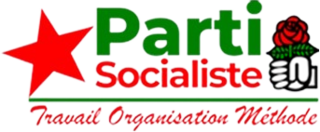
The president of Senegal is the head of state and head of government of Senegal. In accordance with the constitutional reform of 2001 and since a referendum that took place on 20 March 2016, the president is elected for a 5-year term, with a limit of two consecutive terms. The following is a list of presidents of Senegal, since the country gained independence from France in 1960.

The Socialist Party of Senegal is a political party in Senegal. It was the ruling party in Senegal from independence in 1960 until 2000. In 2000, the party's candidate and previous incumbent president, Abdou Diof, was defeated by the leader of the Senegalese Democratic Party, Abdoulaye Wade.
The Rassemblement Démocratique Africain, commonly known as the RDA and variously translated as African Democratic Assembly and African Democratic Rally, was a political party in French West Africa and French Equatorial Africa which was important in the decolonization of the French empire. The RDA was composed of different political parties throughout the French colonies in Africa and lasted from 1946 until 1958. At certain points, the RDA was the largest political party in the colonies in Africa and played a key role in the French government headed by the Democratic and Socialist Union of the Resistance (UDSR). Although the regional party largely dissolved in 1958 with the independence votes for the colonies, many of the national parties retained the RDA in their name and some continue to do so. The political ideology of the party did not endorse outright secession of colonies from France, but it was anti-colonial and pan-Africanist in its political stances.
The And-Jëf/African Party for Democracy and Socialism is a socialist political party in Senegal led by Landing Savané.

Mamadou Dia was a Senegalese politician who served as the first Prime Minister of Senegal from 1957 until 1962, when he was forced to resign and was subsequently imprisoned amidst allegations that he was planning to stage a military coup to overthrow President Léopold Sédar Senghor.

Senegalese Party of Socialist Action was a political party in Senegal led by Lamine Guèye. PSAS was formed as the Senegalese section of the African Socialist Movement (MSA) in 1957, following the breakaway from the French Section of the Workers' International (SFIO).

Senegalese Democratic Bloc was a political party in Senegal, founded on 27 October 1948 by Léopold Sédar Senghor, following a split from the French Section of the Workers' International (SFIO). One month after the split from SFIO, Senghor associated himself with the Indépendants d'Outre-Mer parliamentary fraction.

The Senegalese Popular Bloc was the result of the merger of the Senegalese Democratic Bloc (BDS) of Léopold Sédar Senghor, Senegalese Democratic Union (UDS), Casamancian Autonomous Movement (MAC) and a fraction of the Senegalese Popular Movement (MPS) led by Abdolaye Thiaw. It held its constitutive congress in Dakar from February 23–25, 1957. The merger was however already in effect since August 1956.
African Convention was a political party in French West Africa, originally formed at a meeting in Dakar on 11 January 1957. The CA consisted of the Senegalese Popular Bloc (BPS) of Léopold Sédar Senghor, the African Popular Movement of Nazi Boni in Upper Volta, and the Nigerien Democratic Front (FDN) of Zodi Ikhia in Niger.

The National Assembly is the unicameral legislature of Senegal. The Assembly was previously part of a bicameral legislature from 1999 to 2001 and from 2007 to 2012, with the indirectly elected Senate being the upper house. The Senate was abolished for a second time in September 2012.

Amadou Lamine-Guèye was a Senegalese politician who became leader of the Parti Sénégalais de l'Action Socialiste. In 1945 he and his associate, Léopold Sédar Senghor, were elected to represent Senegal in the French National Assembly. Gueye was also elected to the French Senate in 1958.
Djibo Leyti Kâ was a Senegalese politician and the Secretary-General of the Union for Democratic Renewal (URD). He was a prominent minister under President Abdou Diouf from 1981 to 1995 and founded the URD in 1998 after splitting from Diouf's Socialist Party (PS). From 2004 to 2012, he again served in the government under President Abdoulaye Wade, initially as Minister of State for Maritime Economy and then as Minister of State for the Environment beginning in 2007. Man of the state, he then was appointed Minister under Macky Sall's government before becoming the Director of the CNDT.

Indirect Senate elections were held in Senegal on 19 August 2007. Over 13,000 MPs, local and municipal councillors were eligible to vote in this election, in which 35 of the Senate's 100 members were chosen across the country's 35 districts; President Abdoulaye Wade nominated the other 65 members.

The period from the mid-nineteenth to mid-twentieth centuries is the colonial period in Mauritania.

Mbaye-Jacques Diop was a Senegalese politician. He served as a Deputy in the National Assembly of Senegal from 1983 to 2004, as Mayor of Rufisque from 1987 to 2002, and as President of the Council of the Republic for Economic and Social Affairs (CRAES) from 2004 to 2007. He was a long-time member of the Socialist Party (PS), but split from the PS to form his own party, the Party for Progress and Citizenship (PPC), in 2000, before merging that party into the Senegalese Democratic Party (PDS) two years later.
Zodi Ikhia was a Nigerien politician.
Elections to the French National Assembly were held in the constituency of Mauritania–Senegal on 21 October 1945 as part of the wider parliamentary elections. Two members were elected from the seat, with the winners being French Section of the Workers' International (SFIO) candidates Lamine Guèye and Léopold Sédar Senghor.

The Nigerien Action Bloc was a political party in Niger in 1955 and 1956 led by Issoufou Saidou Djermakoye, a traditional chief and former chairman of the Nigerien Progressive Party (PPN).

Territorial Assembly elections were held in Senegal on 30 March 1952. The Senegalese Democratic Bloc won 41 of the 50 seats.








